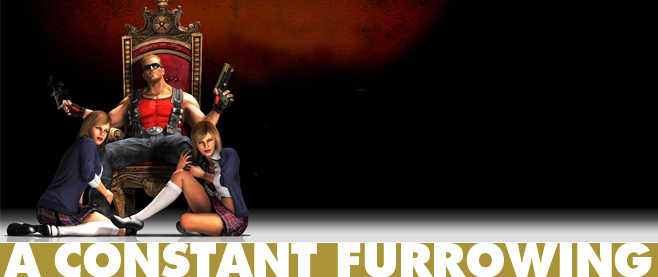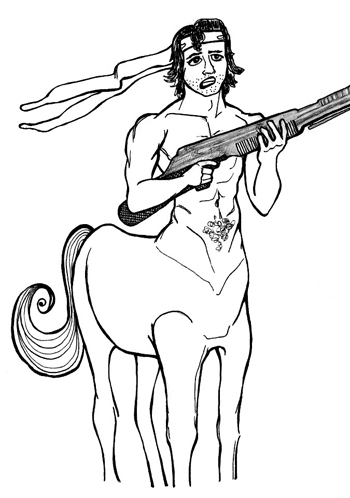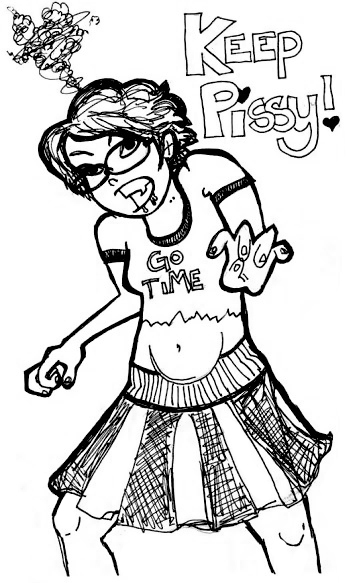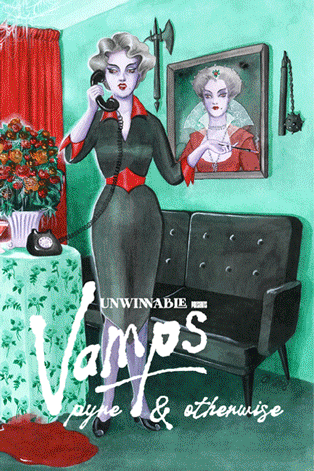
I was a Teenage Sexist
Editor’s Note: This post originally contained a screen-grab of the repellent game Beat Up Anita Sarkeesian. We have since removed the disturbing image, and we apologize for not alerting our readers to graphic content in advance.
———
I raised my hand. Professor Wiman nodded at me.
“I can’t stand female poets,” I said loudly, “because they constantly write about women’s issues instead of normal things.”
My words hung heavy in the air. Wiman blinked and moved on, and I slowly realized I’d said something strange.
Worse, though, was the way a classmate in front of me whirled in her seat. She fixed me with a glare, startled and shocked and fire and ice all at the same time.
Until that instant we had been friendly acquaintances. I think she’d assumed we were kindred. I wore my hair short, just as she did. We were both flat-chested, bony, utterly androgynous. And also I’d always been kind of a brat. So I think she had me mistaken for a fellow feminist. I was not.
Now she stared at me in abject horror. Finally she turned to face forward again, her spine perfectly straight. She never spoke to me again.
A year later, in a bar on New Year’s Eve, I presented my theory as to why comediennes aren’t funny: “They do these minority jokes where you’re supposed to go ‘it’s so true,’ and it’s like, look, you aren’t in the minority; you’re half the world’s population.”
Upon my announcing this, the dude whooped and slapped me a high-five. “Nailed it!” he cackled.
Yep, I was one of the guys.
———
 I was always one of the guys. Most of my friends, always, have been guys.
I was always one of the guys. Most of my friends, always, have been guys.
I’d usually regarded girls with suspicion. It was a self-fulfilling prophecy, too: every day in junior high a group of girls stole my gym shorts and drenched them in the sink.
It was absolutely my fault. From the get-go I wasn’t very well socialized. My birth-dad never let me watch television commercials, and so I spent my earliest childhood with videogames and G.I. Joes and Barbies, none the wiser as to gender norms, wholly inept at differentiating boys from girls. My childhood aspiration was to become Rambo. Not a man, not a woman, not a mother or an astronaut: only that mythical creature called Rambo.
Then I’d moved to smalltown Texas, a far cry from our old poverty-stricken apartment complex in Seattle; meanwhile, my elderly, Midwestern, adoptive parents enforced bizarre, gendered, midcentury rules of behavior. I wasn’t just socially tone-deaf – I was culturally mangled, off-kilter in some nondescript, Caucasian way.
My best college friend used to make this joke: “I’m as good as white, good as white.”
He was South Asian but from the ‘burbs; I knew his joke made me uncomfortable, but I could never pinpoint why. For my own part, I’d internally subscribed to a similar mantra: “I’m just as good as a man, as good as a man.”
Feminists? Ugh. Please. What insufferable people. How about battered husbands? What of fathers’ rights? Or feeding and sheltering the poor? Come on. Invent a real social cause, already.
———
I was always about business. I never paused to wonder whether I was being taken seriously, even, because right up through college, I was. Professors applauded my refusal to use “humankind” as a substitute for “mankind,” or to say “he or she” or “they” in lieu of “he.”
I remember the first time a man told me he was coming to my home to rape me to death. I was 20 years old. I could not understand why he hated my Internet diary so much.
“He misunderstands me,” I remember thinking to myself. “I’m not the type of girl he thinks I am.”
———
My friend and colleague Cara recently directed Twitter to a fascinating study. It claims that self-identified feminists are less hostile toward men than other women are.
Now, the math is squirrelly, the testing pond much too small, but the idea rings legit. Here’s the theory behind the study’s assessment: women who subscribe to traditional gender politics are often none too happy about it, and they might resent other people as a result.
———
Immediately after graduation I moved in with a young man. While he was away at work I was in charge of cleaning, laundry, planning dinner. There was a tacit contract between us. We were both Protestant, after all – church-goers, nearly! – and we did that thing where you conflate “tradition” with “morality.” I was dutiful and cheery.
Without spending too many more words on the tension of that relationship dynamic: oh, I was resentful. Was I ever.
———
 My inch-long hair and combat boots had never hurt my romantic life any; we had all been teens in the 1990s.
My inch-long hair and combat boots had never hurt my romantic life any; we had all been teens in the 1990s.
What I mean is, in the ’90s androgyny was a style rather than a marker of sexual preference. Watch any episode of 90210! Cuffed T-shirt sleeves are everywhere! Everyone wore bleached denim and CK1!
Guys understood me. I liked Kevin Smith movies! I was a great wingwoman! If I wore a dress, I did it reluctantly. I only ever felt genderless and murky – the soul of a “man,” I always thought, where “man” maybe just means “normal.” Like, you identify with the male heroes in books and movies and songs, because storybook heroines, excepting the spunky ones, are prissy wimps who like ballet and horses. Yep: I was a carefree kid, an unladylike tree-climber.
See? That seems all right! I was an ordinary tomboy!
But it was way more insidious than that. I often ignored other women’s opinions, basing my judgment entirely on how they were dressed. I scoffed at girly things. I considered myself an exception to the lady-rule, all thanks to my easygoing manner, my coarse sense of humor, my swaggering sense of self.
Feminists have their own term for my anti-feminist leanings: “internalized sexism.”
I was a teenage sexist. I was a misogynist.
———
There’s a riddle I read as a child, and I didn’t understand its meaning until long after college:
A father and son are in a car and, as they are crossing some railroad tracks, its engine stalls. An oncoming train smashes into the car. The father is killed instantly; the son lives, barely, and is rushed to a hospital. The doctor enters the room, sees the child splayed on the table. “I cannot operate on this child,” the doctor says; “this child is my son.” How? How can this be?
I recently reminded some friends of this riddle.
“I used to know this one,” a friend said, and then she sat, struggling to remember the riddle’s answer.
“Oh, no,” I said to her. “You see? You see how deeply rooted it is?”
———
I’d received the phone call at the art gallery (I was working in the gallery when I wasn’t writing reviews for Electronic Gaming Monthly). It was 2006; a job had opened in California.
It was a community management position at a gaming website – a role that, at the time, was always delegated to a female. I was flattered, and since I was easygoing and boyish, I figured I’d be good at it. When I accepted, my new employer made the happy announcement.
I remember the first Internet reaction, posted by a semi-anonymous user: “Hotness fail.”
[pullquote]Feminists? Ugh. Please. What insufferable people.[/pullquote]
The next reaction – a penis crudely MS-painted into my mouth – was harder for me to parse.
Then, in response to something I’d written in a discussion thread: “She’s like Einstein with a vagina!” Followed by: “You see where you’re wrong, don’t you?”
Wha – ooohhhhh.
Everyone wants to be liked, and I was sad that I wasn’t. But it was worse than that – I hadn’t even done anything yet.
“Should I move to California?” I asked my boyfriend. I unpacked a box. Then I repacked it.
———
“Is this stuff normal?” I asked my friends quietly. I took an informal survey: “Do people act like this all the time?”
“It’s the Internet,” my friends said helplessly.
“They’re probably just kids,” my boyfriend added.
I checked their ages. They were not kids. Not all of them were even male.
I didn’t want to leave Chicago.
———
But I did move, figuring I’d prove the Internet wrong with my own competence, or at least by being a rad girl. I reasoned, too, that I couldn’t live with myself not knowing what lay in store at my dream job.
[pullquote]I felt like the Internet had started following me around in real life.[/pullquote]
The complaints eventually became predictable. Ugly, fat, lesbian, secretly a man, a bad spokesperson for the entire female sex, and the occasional – and distressing! – “I’d pee in her butt.” (And, just as a fun, friendly reminder that some people are breezily racist, “Jewish,” lobbed here as an insult.)
Oh, sure, I was initially confused. I am heterosexual, I am not Jewish, and certainly nobody has ever peed into my butt. I didn’t think I was that ugly, that fat, and worst of all I was so naive I didn’t always realize I was being sexually insulted.
My support system encouraged me to ignore all this, but I never quite toughened up.
Instead the opposite happened: sustained daily over two consecutive years, and compounded with my parents’ failing health, I broke. I completely cracked.
By Spring 2008 I was in therapy. My therapist told me, alarmed, I needed more therapy.
Humiliating. It was so humiliating, how weak I had become.
———
When people meet me for the first time, they must assume I’ve always had a big chest.
All my life I had been able to pass as credible, as a sexless peer, as a scrappy pixie. My childhood doctor is still flummoxed as to how I instantaneously grew boobs at the ripe old age of 24. This abrupt new development drastically changed how people responded to me: after all, I very suddenly was possessed of the chest of a bimbo.
If nobody else were around, men did this new thing on the street: they’d turn and say foul things. I felt sick. Or, I felt worse than sick – I felt like the Internet had started following me around in real life.
———
 Feminists and others have coined another great term, “gender dysphoria.” That’s when you feel one way inside, but your body dictates that people react to you as if you were somebody else.
Feminists and others have coined another great term, “gender dysphoria.” That’s when you feel one way inside, but your body dictates that people react to you as if you were somebody else.
Those dissonant experiences can be impossible to reconcile, and sometimes people deliberately change their bodies to match their feelings. Other people try to change their feelings to match what their bodies are projecting. Maybe for some people the answer is in the middle, something more liminal.
Of “sex,” “gender,” and “sexual preference,” gender is the one that is fake. Gender varies from culture to culture, from era to era; it’s the one you get to put on and take off, like fingernail polish or a skirt. It’s the construct advertisers use to market one type of doll to girls and another type of doll to boys.
———
It seems to always happen this way, doesn’t it?
Girls – the ones we think of as “cool” – don’t trust other women, women who play by gender “rules” that the rest of us cannot quite understand. The most important things those women can seemingly do are spend money on clothes and appeal to the opposite sex.
Meanwhile, we ourselves don’t feel particularly female. We only feel like people.
It’s a tough fall. People intuitively detect that attitude, go out of their way to remind you that you’re not fooling anybody. You are a woman, and you will only ever be a woman.
When enough strangers say enough sexually charged things to you, it demands you completely reconsider yourself. Who do you think you are? Who are you supposed to be? You are a stranger in your own body.
I am 30ish years old, and my life is divided into two dramatically uneven halves: before 2006, and then the six years after.
“I know you wish I’d known you ‘before,'” my good friend Dave once told me, “but I like you now.” How terribly kind of Dave, that liar.
———
Lately someone accused me of “girl-on-the-Internet syndrome.” He could have leveled a lot of valid criticisms at me, given what I’d written; this particular blow, however, struck me as hollow.
“I have been on the Internet since 1993,” I replied. “I got over being on the Internet long before I ever got over being a girl.”
———
Do you remember when one games journalist — one of the best, and happenstantially a female — pleaded that we recognize her as a person? Like, as just an ordinary, normal human being? It was heartbreaking.
I remember reading that column and thinking about how, even if you actively work to not “prove your gender” to others, there is an enormous faction that will conversely work to remind you that you are a woman, and “just” a woman, every chance they get.
[pullquote]I have been on the Internet since 1993. I got over being on the Internet long before I ever got over being a girl.[/pullquote]
They might even say it benevolently: “Why, she’s my favorite female games writer!”
———
I don’t think embracing feminism has to be difficult, but it sure was for me.
First, I had to make peace with being a woman.
Next, I had to make peace with being terrible at being a woman.
Then I had to be okay with my experiences not being unique, since the same stuff – variations on a theme, if you will – is shared by a whole lot of people, many but not all of whom are women.
Finally, I adjusted my expectations – not lower, but higher. Feminists are optimists!
I am half-serious when I call myself a “bad feminist.” I’m still working on my longstanding bad attitude, for instance, and on all the ways I’ve hurt myself with my bad attitude.
I’ve also hurt others. In the course of my young adulthood, I’ve stood by some pretty injurious bullshit. Maybe my ethics are fueled as much by guilt as anything else.
———
A lot of my favorite people are rigorous anti-feminists, but in the nicest possible way.
These folks really do treat women as peers – academically, professionally, personally, romantically – and many of these right-headed people shy from any sort of “battle.”
These anti-sexists always turn a polite, blind eye. Why keep picking fights? Diatribes are no fun. Stop whining and buck up, you! If your vagina (or whatever you have there, since not every woman or feminist is privileged to have one) is the worst you can complain about, it’s gonna be one easy ride, sister! Or mister. Whoever. Whomever.
And many of those well-meaning, anti-sexist people are the very same good people who are the most surprised by the backlash Anita Sarkeesian has encountered, I suspect.
I’ve watched this unfold with an awful, wry type of schadenfreude. I’m an ex-community manager, here! If anything, I’m mystified by others’ surprise. Was this type of thing really so invisible before?
No, of course it wasn’t. We were just too happy to ignore it, because it’s never been “this bad” or “this flagrant.”
It didn’t surprise the average girl-on-the-Internet, I guarantee, because the average girl on the Internet is required to either defend her very existence, or else disappear.
[pullquote]The Internet hates everyone.[/pullquote]
Maybe the “average guy” doesn’t witness all this, though, because he is so nice. What kind of monster says such things? Not I, he reasons.
———
I get it. I do. The Internet hates everyone. And you can’t fix everyone. It’s easy to be a pessimist, or else it’s easy to feel like enough has changed (or too much has changed so please hush already).
Moreover, the Internet condemns any dissenting opinion. Consider the higher-profile videogame critic: should he score a game a point too low, here come the superfans, wishing him cancer and AIDS. We turn a blind eye toward those superfans. “The lowest of the low,” we nod, “the vocal minority! Don’t feed the trolls.”
What we mean is, That’s not me. I know I am a good person. Those people aren’t my problem.
———
You don’t have to be an outspoken feminist on the Internet to be harassed or bullied, although I’ve heard it helps.
Sometimes you can just be a lady on the Internet, though. Sometimes you can make the audacious mistake of being anything less than invisible. Being a member of half the sum total population is inexplicably enough to make you an easy target on Xbox Live. Good God, imagine what the Internet would be like if you were actually different from other people somehow!
You don’t even have to be on the Internet! You can just walk down a city street alone, even during normal business hours!
No, it doesn’t happen only to girls – everyone gets harassed or attacked sometime. But it does happen especially to girls.
Even speaking as an ex-anti-feminist, I just cannot understand how that idea is controversial.
———
 Anita Sarkeesian offered to apply the same lens to videogames as she already affords other media, like film, television, music. There is mainstream cultural validity here. “Gamers” maybe ought to have been excited by her very interest.
Anita Sarkeesian offered to apply the same lens to videogames as she already affords other media, like film, television, music. There is mainstream cultural validity here. “Gamers” maybe ought to have been excited by her very interest.
Chillingly, the people who have abused and threatened Anita Sarkeesian are not anomalous, are not sociopaths. They are ordinary — albeit anonymous — masses of people, admitting online what they’d like to say aloud. They are not all little boys. Many are adults. Some are women.
Feminism is all about the masses. We are, every last one of us, complicit in fostering an environment where this kind of vitriol is “normal,” where that kind of hatred toward any one person, or any grouping of people, is permitted to perpetuate and fester.
“It’s the Internet,” we shrug. “These things happen,” we tell one another helplessly.
What does it take to get us to notice that wrongheadedness? Evidently, we react only to ire and hatred – hatred that is utterly out of proportion with Sarkeesian’s Kickstarter itself, hatred that finally oversteps into criminal behavior.
And that aloofness-until-some-breaking-point isn’t subcultural; it’s super cultural! Everybody! Everybody is responsible! It’s like voting!
Feminism is on your side! Feminism is for everybody!
———
I read a lot of Internet, and I am beginning to think there might be some fundamental misconception about feminism floating around.
Feminism isn’t only about correcting social inequality and wage disparity. If that’s all feminism is, I was a feminist way back when I believed you could cut your hair short and behave just as boyishly as you liked, getting ahead on your balls alone. Don’t cry, emo girl! You live in a boys’ world, so be a man!
Instead, feminism – and other types of social justice, I figure – acknowledges that there is an invisible pattern of experience that comes along with being, very visibly, something else.
You don’t have to think of ladies as “victims” – I’d prefer you didn’t – and you don’t even have to think of some experiences as “baggage.”
But feminism does ask you, as an ethical human being, to objectively reexamine certain standards of behavior, which themselves are often based on an internalized, invisible set of shared beliefs and values.
Feminism isn’t about holding another sex in higher esteem than the male sex. Rather, it’s about anti-sexism.
It’s about making sure your child doesn’t grow up believing she is somehow subhuman.
And if someone ever makes your child feel like he or she deserves abuse, you better hope that kid is confident and surefooted enough to fight back.
———
I wrote this piece over a week ago. A lot has happened since then. For one, Anita Sarkeesian became the subject of a face-punching sim. That actually made me grin in recognition: in the olden days you could slap a Spice Girl, watching her face blister and bruise and swell until, finally, the abuse her pretty face could take somehow maxed out. In my day I slapped a lot of Spice Girls. (Update: On second thought, having now seen a screenshot from the Sarkeesian game for the first time, Slap a Spice Girl seems downright twee in “comparison.”)
I’m sorry this column is so long. I tried to shorten it, I really did. I’ve excised three long passages already: it’s difficult to articulate what it feels like to be a woman, one who doesn’t feel like a woman, but who obviously is a woman, who doesn’t want to ever pick between being a “cool lady” and a “high-strung” one.
———
I remember when, in 20th Century American Poetry class, a girl turned and fixed me in place with an inscrutably steely look.
What a nag, I must have thought in that interminable moment. What a bitch.
I was insulted only because she’d thought I was her friend. How stupid, I probably said to myself.
I misunderstood her glare, and then again, I didn’t misunderstand at all. She had only acknowledged me with startled disappointment, really, and that alone was enough to insult me.
———
Jenn Frank likes to draw centaurs. Follow her on Twitter @Jennatar.





